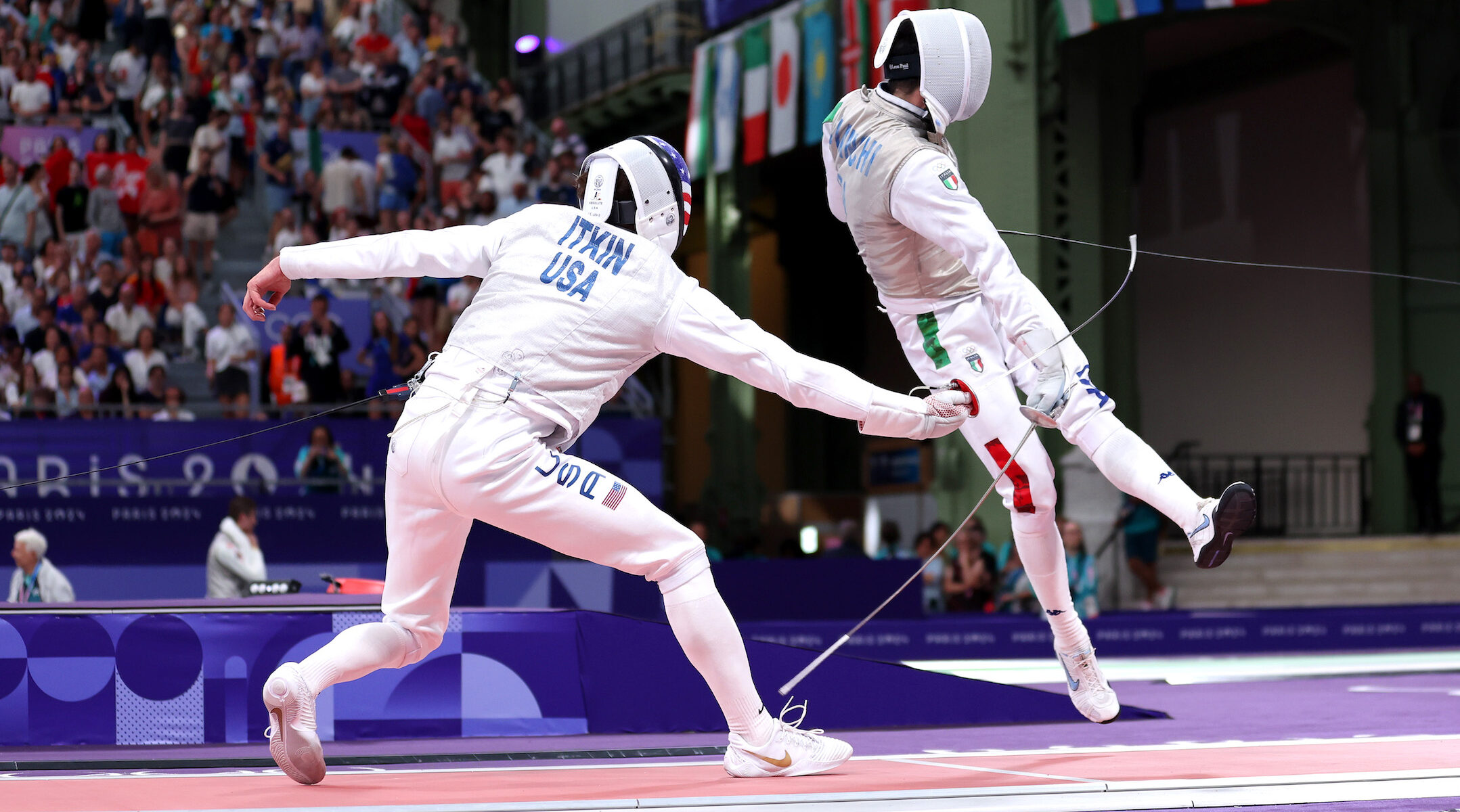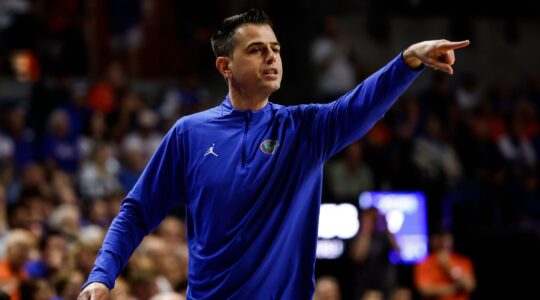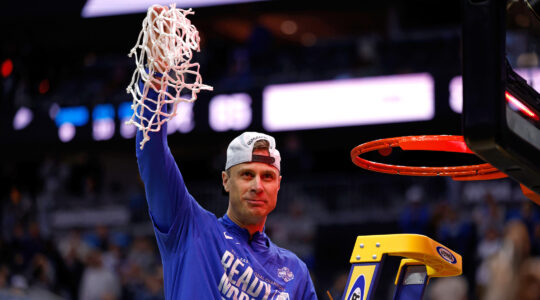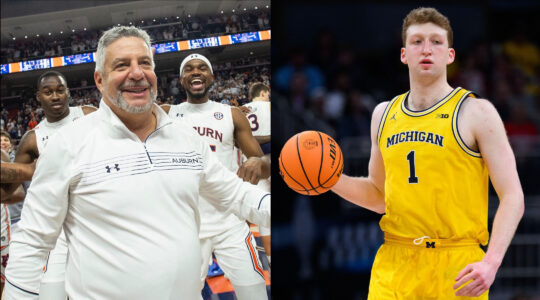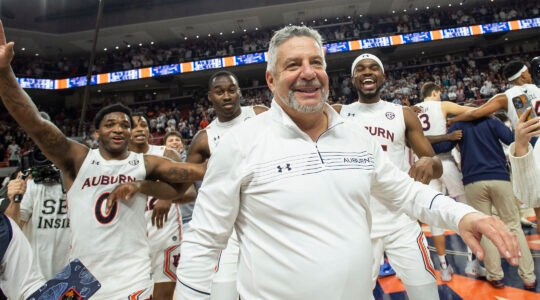PARIS — Eight decades ago, the Grand Palais of Paris seesawed between hosting propaganda of the occupying Nazis and, after liberation, one of the first exhibitions chronicling the Nazis’ crimes against European Jews.
Now, it’s hosting a very different back and forth: between world-class swordsmen, as the sole location for fencing in the Paris Olympics. And at least when it comes to the U.S. team, Jewish athletes are taking center stage — even if, so far, they aren’t faring particularly well.
Six of the 20 athletes on the U.S. team are Jewish or come from Jewish families — not quite a minyan, but still a feat given that just 2.4% of Americans are Jewish. Seven-time Olympic U.S. coach Yury Gelman is also Jewish.
Each athlete took a different path to the team, so there’s no single explanation for why Jews are disproportionately represented in fencing. But the sport has a rich Jewish history, as well as unusual strength in Russia and the former Soviet Union, where several of the Jewish fencers have roots. Plus, the sport can be hard to access outside of major population centers, where American Jews tend to live.
Mitchell Saron, 23, who competes in sabre, said he thought the Jewish presence on the U.S. team “sounds like a lot.” But he noted that because of fencing’s lower profile compared to other sports, people tend to get into fencing through word of mouth.
“I think if you hear someone from your tribe is getting to fence here or there, that can spread very fast,” said Saron, who is both Filipino American and Jewish, grew up in New Jersey and graduated from Harvard University this year.
In addition to Saron, these are the other Jewish fencers on this year’s squad.
- Elizabeth Tartakovsky, 24, who picked up sabre fencing in the United States from her great-uncle, Gelman. Both of her grandfathers are Jewish, and her parents emigrated from Kyiv in the early 1990’s. “Yury is the closest family we have in the U.S.,” she said. The 2022 NCAA sabre champion and 2023 individual world championship bronze medalist hails from Livingston, New Jersey, and also fenced at Harvard; she’s making her Olympic debut in Paris.
- Eli Dershwitz, 28, who is returning for his third Olympics. He made the 2016 Rio Olympic team after his freshman year at Harvard. As a junior, he won his second consecutive NCAA sabre title and became the first male fencer in the United States to finish a season ranked No. 1 in the world. He briefly considered retiring after the Tokyo Olympics at age 25 but stayed in the game. Last year, Dershwitz became the first American man to win an individual senior world championship title in sabre.
- Nick Itkin, 24, a two-time NCAA foil champion at the University of Notre Dame, who was introduced to fencing by his Jewish father, Misha, who also emigrated from Ukraine and opened a fencing club in Los Angeles. Under his father’s guidance, Itkin became a four-time world championship medalist and a 2020 Olympic bronze medalist in the team foil competition. Itkin traveled with his father to Israel in 2022. “I can’t say that I’m very much involved in the Jewish religion, but my father, it’s a huge part of his identity so obviously I grew up experiencing the culture and the religion,” he told the Sporting Tribune in May. “When we visited Israel, it was one of his goals, to bring his family there. It meant a lot to him.”
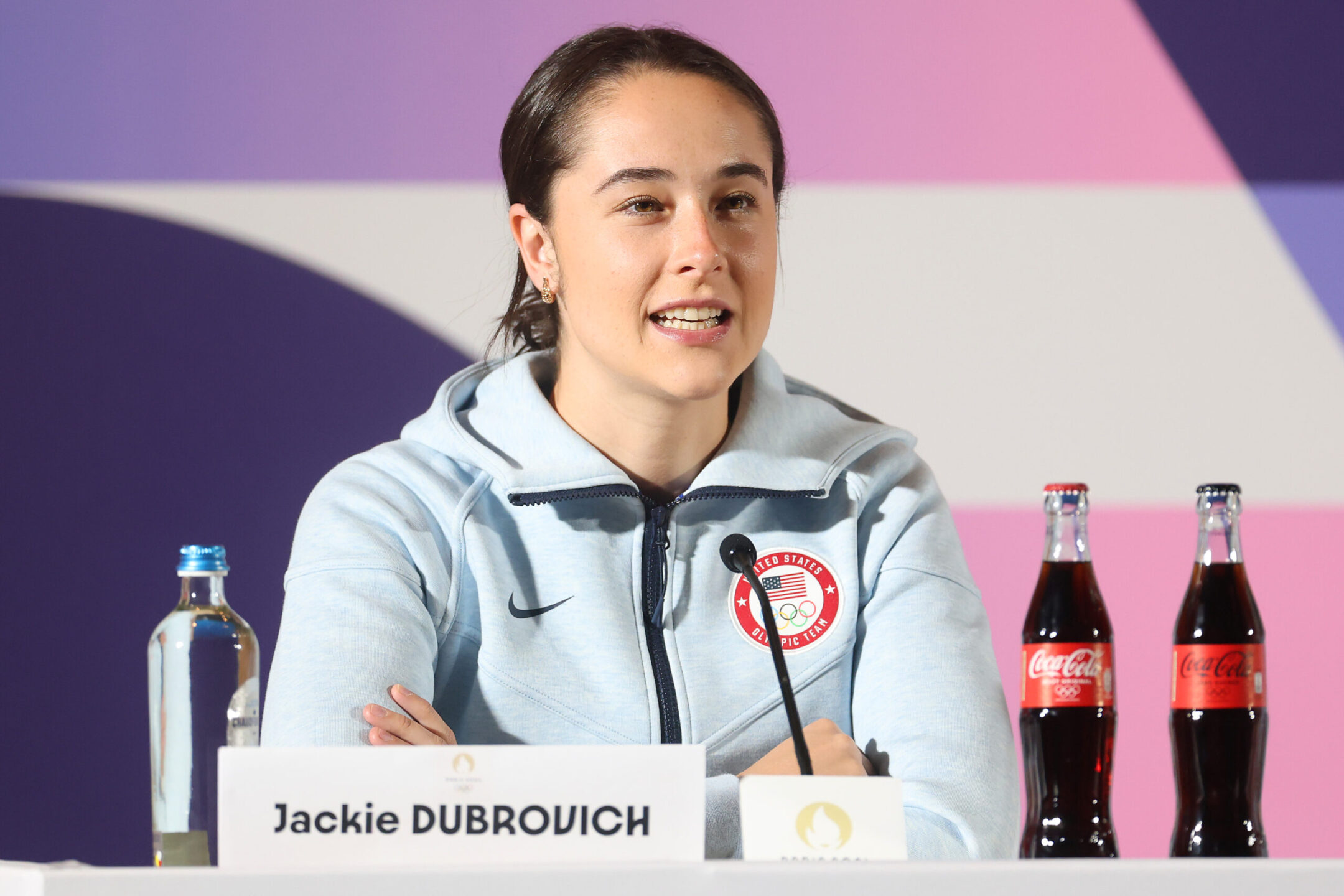
Jackie Dubrovich of team United States speaks during a press event ahead of the Paris 2024 Olympic Games on July 24, 2024 in Paris. (Michael Reaves/Getty Images)
- Maia Weintraub, 21, who won gold at the 2019 European Maccabi Games for Jewish athletes. Weintraub took a year from her studies at Princeton University to train for the Olympics. “I was able to really focus on my fencing and not let school bog me down, especially finals,” said the 2022 NCAA women’s individual foil champion from Philadelphia. She stayed on campus to train with her college team and landed a job working in a lab researching mosquitos — which is something of a family business. Weintraub’s Jewish father, Jason, is an entomologist who specializes in moths and butterflies.
- Jackie Dubrovich, 29, of Maplewood, New Jersey, who is competing in her second games after narrowly missing a medal in team foil in Tokyo four years ago. Dubrovich graduated from Columbia University in 2016 where she studied, among other things, Russian literature as a nod to her first language and her parents who both emigrated from Belarus in the late 1980’s.
Dershwitz, Dubrovich and Saron lost early matches this weekend, knocking them out of individual competition, while their U.S. teammates Lee Kiefer and Lauren Scruggs took home medals. Meanwhile, Yuval Freilich, the first Israeli man to become a European fencing champion, also lost in a surprise upset in his first match.
The athletes all follow in a long tradition of Jewish fencers. The sport was particularly popular among upwardly mobile Jewish students in Europe in the late 19th and early 20th century, when it was seen as a way to assert strength amid antisemitism. Theodor Herzl, the founder of modern Zionism, was trained as a fencer and was famously inspired to write an early essay about antisemitism after watching a duel between a Jew and a non-Jew in France.
The affinity of Jews for fencing has fueled an extensive Olympic medal count, spanning several countries. Many of the Jewish winners took the podium in the years leading up to World War II, including all three of the women’s winners in 1936 in Berlin. (One, Helene Meyer, openly supported the Nazis.) While some used the sport to escape the Nazis, others were murdered during the Holocaust, including the Hungarian gold medalist Attila Petschauer, whose brutal murder inspired part of the 1999 movie “Sunshine,” starring Ralph Fiennes.
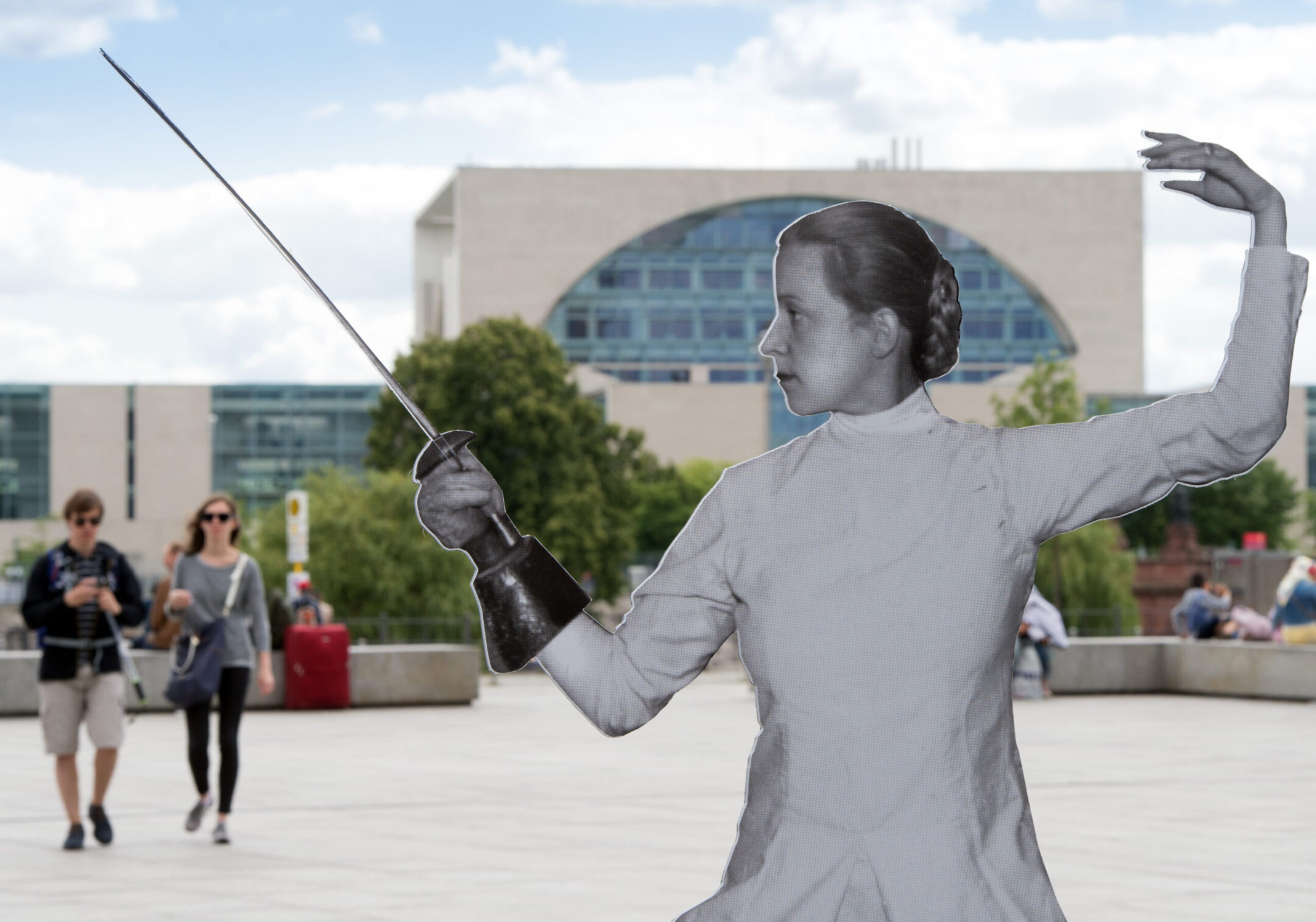
A life-size image of the Olympic winner in fencing Helene Mayer is on display in front of the Chancellery in Berlin, Germany, 26 July 2015. The image was part of a display about Jewish athletes in German sports, produced in conjunction with the 2015 Maccabi Games (Soeren Stache/picture alliance via Getty Images)
Now, that so many of the Jewish fencers have roots in Russia reflects the long tail of a different cultural moment, the mass emigration of Jews from the former Soviet Union after its fall. Russia has long been a powerhouse in fencing (though it is banned from Olympic competition this year because of its invasion of Ukraine) and many Jewish athletes found success in the sport there. In fact, the first Olympic champion in the history of Soviet individual fencing, Grigorii Kriss in 1964, was Jewish. When Jews left en masse in the late 1980s and early 1990s, many, such as Gelman and Itkin’s father Misha, took their passions and skills with them — which some of their children have now inherited.
The heyday of Jewish fencers could be winding down. Gelman, who was a top fencer in his native Kyiv and now owns Manhattan Fencing Center in the Garment District, said he has noticed fewer and fewer Jews coming up through the ranks of the sport.
“I don’t know why,” Gelman said. “But for sure it’s much less.”
For now, the Jewish fencers are all focused on the present, not the future of their sport. In particular, Itkin hopes to be the first U.S. male fencer to take the top ranking in foil.
At the last Olympics, in Tokyo, Itkin said, “all my [foil] teammates were older than me. I was 21 and they were winning everything. They took me under their wing and now we’re really close. We’ve never been more motivated to finally get this Olympic gold medal.”
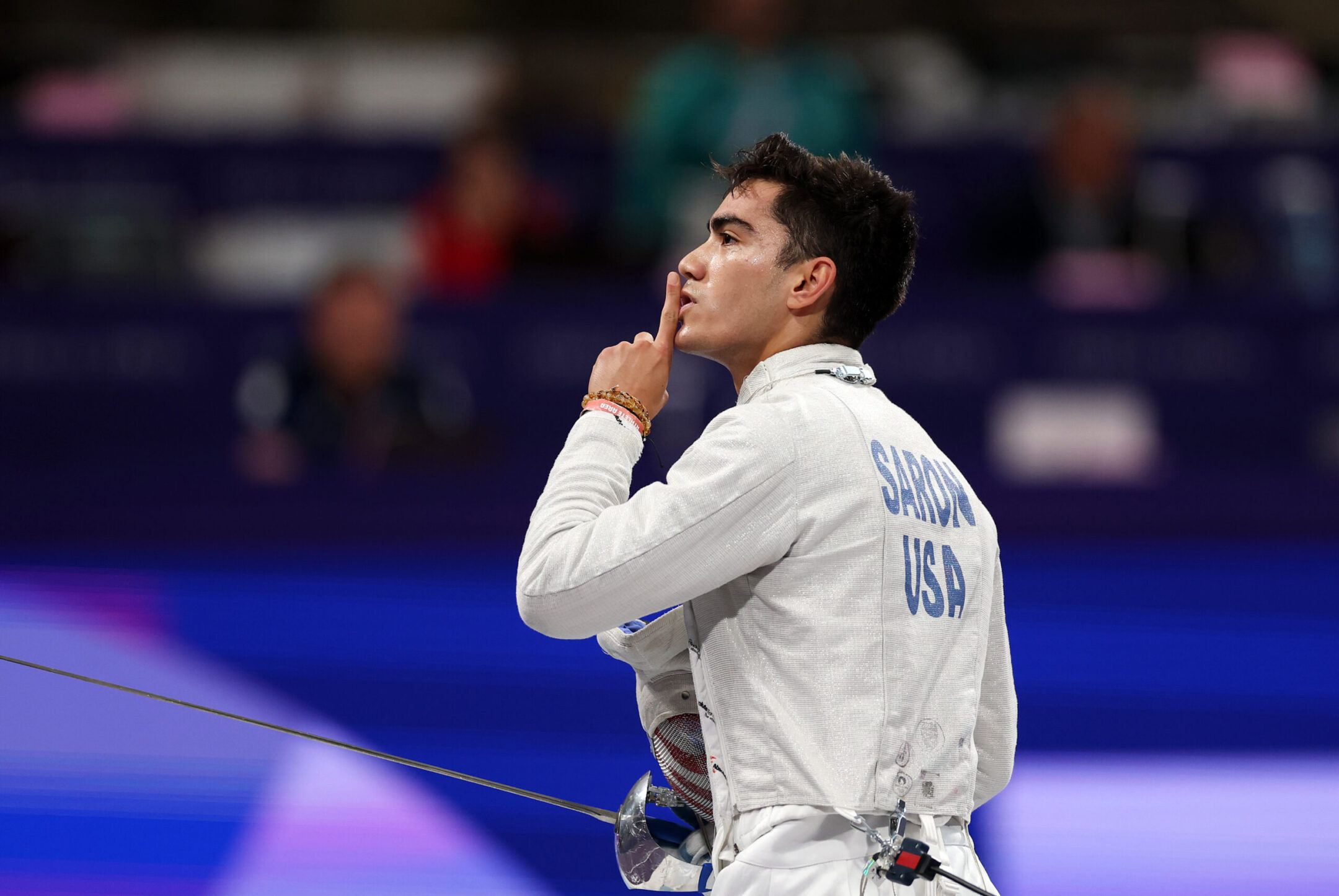
Mitchell Saron of Team United States, one of six Jewish fencers on the team, reacts during day one of the Olympic Games at the Grand Palais in Paris, July 27, 2024. (Patrick Smith/Getty Images)
And they recognize the significance of their participation in fencing competitions in places — including Paris — where they would have faced persecution in the past.
“I feel a tremendous amount of pride being able to compete for the U.S., often in the country that my grandparents left,” Dershwitz said. He recalled bringing teammates along on a quest to locate the grave of one his great-grandparents when he competed in — and won — the 2015 junior world championship in Tashkent, Uzbekistan.
“They couldn’t have imagined a situation in which I’ve gotten to compete on the world stage in a crowd that maybe didn’t want them there 100 years ago, but now they’re cheering for you, want the best for you, and consider you one of their own,” Dershwitz said. He added, “My parents tell me that my grandparents would be proud.”
Correction: This article has been updated to correct Nick Itkin’s past Olympic record.
JTA has documented Jewish history in real-time for over a century. Keep our journalism strong by joining us in supporting independent, award-winning reporting.
